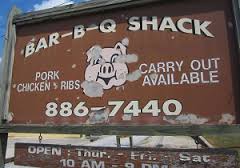The E. coli O157:H7 outbreak linked to the Bar-B-Q Shack in Toccoa, Georgia has sickened at least 11 people. Seven of the ill persons have been hospitalized. And five have developed hemolytic uremic syndrome (HUS), a serious illness which can cause kidney failure.
 In most outbreaks, we know that illnesses are greatly underreported, because most people can recover from Salmonella or Vibrio infections without a doctor’s help. But Shiga-toxin producing E. coli (STEC) infections are different. That pathogenic bacteria causes potentially deadly illness that can last for a long time.
In most outbreaks, we know that illnesses are greatly underreported, because most people can recover from Salmonella or Vibrio infections without a doctor’s help. But Shiga-toxin producing E. coli (STEC) infections are different. That pathogenic bacteria causes potentially deadly illness that can last for a long time.
A study from the CDC found that duration of illness is the most important statistically significant symptom that increased both the probability of visiting a doctor and having a stool sample taken. Violent, bloody diarrhea that goes on for days is a symptom people just can’t ignore.
Blood in the stool really requires a stool sample test of some kind. Shiga toxin-producing E. coli infections have a multiplier of 26. That means that only 1 in 26 of all STEC cases are reported to public health officials. The CDC says that multipliers for STEC infections ranges from 2 to 27. The multiplier for Salmonella outbreaks is 29, and the multiplier for Campylobacter outbreaks is 30. That means that more than 300 people may actually be ill in this particular outbreak.
E. coli infections are reportable illnesses. That means that if an E. coli infection is diagnosed, the doctor must report the illness to public health authorities because they are a public health risk. This helps identify outbreaks and trace the cause of the illnesses, and also helps prevent the bacteria’s spread. Passing along STEC bacteria is unfortunately quite easy. It only take 10 E. coli bacteria to cause a serious illness.
So if you ate at the Bar-B-Q Shack in Toccoa, Georgia in early May and developed symptoms of an E. coli infection, which include severe abdominal cramps, mild fever, and bloody/and or watery diarrhea, see your doctor and ask for a stool sample. Even if you recover completely, your long term risk for complications such as kidney disease will be increased and you should be monitored.




